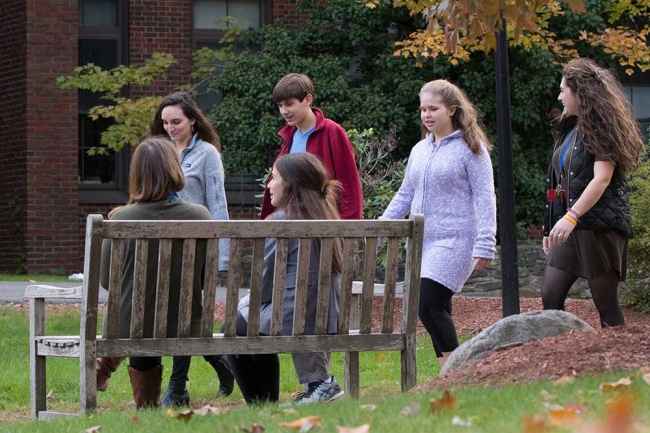Child and Adolescent Outpatient Clinic
Helping children and teens learn skills for a lifetime of mental well-being
At McLean Hospital, we recognize the challenges children and adolescents with mental health conditions face.
Through our Child and Adolescent Outpatient Clinic, located on the campus of Sancta Maria Nursing Facility in Cambridge, we are focused on helping young people and their families cope with mental illness.
Our outpatient care includes group therapy and medication management through our general clinic and testing via the Child and Adolescent Testing Service (CATS).
For more information or to make a referral, please call 617.674.5310.
The Child and Adolescent Outpatient Clinic is ideal for kids and teens who:
- Are struggling with mental health conditions including depression, anxiety, OCD, phobias, and bipolar disorder
- Need skills to better understand and manage their symptoms
- Seek testing to evaluate difficulties in educational, home, or social settings
Our group and individual therapy options help young people and their families cope with psychiatric illness and the challenges it often brings.
Some of these services are primarily available for those who are stepping down from the McLean-Franciscan Child and Adolescent Inpatient Program and the Adolescent Acute Residential Treatment (ART) program. However, there may be openings for other children and adolescents seeking outpatient treatment, subject to the availability of staff.
Treatment Approach
The Child and Adolescent Outpatient Clinic provides an initial evaluation that may lead to additional services, such as group therapy, individual therapy, medication evaluation and management, parent guidance and support, psychological testing, and neuropsychiatric testing.
Treatment focuses on the diagnosis of developmental problems and psychiatric illnesses.
We work closely with each patient and their family to create personalized treatment plans that may include individual or group sessions, cognitive behavior therapy, dialectical behavior therapy, and medications when clinically indicated.

McLean’s Child and Adolescent Outpatient Clinic offers group and individual therapy to help kids manage their mental health
Group Therapy
Groups help young people develop social and other skills that can directly benefit them at home, at school, and in interpersonal relationships. Group therapy provides adolescents with peer support as well as skills to help them deal with their illness.
Membership for each of these sessions requires that the adolescent be in weekly individual therapy.
Individual Therapy
Individual therapy ranges from play therapy for younger children to insight-oriented models for older adolescents. Cognitive, behavioral, and medication therapies are applied when needed. Support for parents includes education about their child’s illness and help fostering new parenting skills.
As with McLean’s other outpatient programs, our clinical services are focused on stabilization. Should longer-term treatment be necessary, assistance is provided in finding appropriate community resources.
Testing
Our Child and Adolescent Testing Service (CATS) offers evaluations for children, adolescents, and young adults ages 5 to 22 who have neuropsychological and/or psychological difficulties that are interfering with their ability to manage demands at home, at school, and/or with their peer group.
CATS was created to more effectively help young people with their unique needs. Through comprehensive testing, our trained staff will gain a thorough understanding of a child. Our professionals can offer expert evaluations and make recommendations for treatment, educational planning, and more.
CATS is ideal for:
- Youth ages 5 to 22 who have psychological and/or neuropsychological conditions that are interfering with their ability to manage demands at home, at school, and/or with their peer group
- Youth who have diagnoses such as ADHD, nonverbal learning disability, social interaction challenges, mood disorders, anxiety disorders, post-concussive syndromes, executive functioning difficulties, and specific reading, writing, and arithmetic disorders
- Helping parents, teachers, and other professionals better understand why a child is struggling and how to be helpful
Although our evaluations are “diagnostic,” we also see patients who already have diagnoses, but who still need help with treatment and/or educational planning.
Please note that we are unable to accommodate individuals who are not fluent in English, who have significant sensory or motor difficulties that require specialized testing procedures, or who have autism or moderate to severe pervasive developmental disorder, however we will refer these individuals elsewhere.
The evaluations are made up of four or more parts, including these required elements:
- Parent interview
- Review of current and previous records, evaluations, and clinical information
- Review of school information
- Administration of neuropsychological, psychological, and academic testing
The testing results along with our review of the child’s records inform our recommendations. We share the results via a feedback meeting with parents (and adolescents, if appropriate), as well as in a written report.
A 90-minute feedback meeting will be scheduled for two weeks following the first day of testing so that our evaluation coordinator can talk with parents and guardians about the child’s testing results.
The goals of the meeting include using the testing information to address specific concerns and questions, talking about diagnostic conclusions, specifically addressing the educational implications of the results, discussing educational recommendations (such as parent education), and reviewing recommendations about next steps.
If we determine that it is important for an adolescent to have a separate feedback meeting, this will be arranged as well, and is included in the cost of the evaluation.
Parents and guardians receive a written report by mail, approximately a month after the feedback meeting. The report includes information about the testing administered, how the child performed, and conclusions and recommendations for the child, the child’s school, and the professionals with whom the child works.
Admission & Cost
Admission
McLean’s Child and Adolescent Outpatient Clinic is ideal for children and teens with mental health conditions including depression, anxiety, OCD, phobias, and bipolar disorder.
In addition, our testing service benefits children, adolescents, and college students who are experiencing difficulties in educational, home, or social settings due to the impact of difficulties that are neuropsychological (executive functioning challenges, head injury, concussion), learning-based (dyslexia, language-based learning disability, nonverbal learning disability), and/or psychiatric (anxiety, mood disorders, thought disorder).
Individuals who benefit from testing are often “stuck” and need a good treatment and/or educational plan so they can move forward.
For more information or to make a referral, please contact:
Child and Adolescent Outpatient Clinic
Phone: 617.674.5310
Child and Adolescent Testing Service (CATS)
Phone: 617.674.5320
Cost
McLean accepts Medicare, Massachusetts Medicaid, and many private insurance and managed care plans. Some of our outpatient services accept insurance, while others are self-pay. Please contact the programs to find out more.
Our testing service is part self-pay and part insurance-based. Some insurance plans will cover a portion of the cost of the testing, but please note that academic testing and the parent education component are not considered medically necessary and therefore are not covered by insurance. The costs that are not covered by insurance are $2,000.
More information on insurance providers accepted by McLean Hospital may be found on the Mass General Brigham website. You may also find it beneficial to review McLean’s patient billing and financial assistance information.
Treatment Team
Program Leadership

Diane Bedell, LICSW, Program Director
Ms. Bedell is program director program director for McLean’s Outpatient Services, where she has overseen rapid growth in several programs. She is also program director of the Clinical Evaluation Center, where she has been successful in keeping the intake and admissions processes up to date with the changes in health care systems.

Karen Monroe, MD, Medical Director, Child and Adolescent Outpatient Clinic
Dr. Monroe has been the medical director of McLean Hospital’s Child and Adolescent Outpatient Clinic since 2004. She also serves as the child and adolescent psychiatrist for the 3East Outpatient Clinic. A dedicated teacher, Dr. Monroe coordinates the child outpatient rotation for adult psychiatry residency training. She has a strong interest in resilience in children and adolescents.
Staff and Associates
Our expert clinicians and support staff have dedicated their careers to working with young people and so are able to provide compassionate, focused care to this patient population.
This multidisciplinary staff works collaboratively with family, community-based clinicians, schools, and social service agencies to establish realistic treatment goals for each child.
The Child and Adolescent Outpatient Clinic operates within the Simches Division of Child and Adolescent Psychiatry, led by Daniel P. Dickstein, MD, FAAP.
Frequently Asked Questions
Where is the Child and Adolescent Outpatient Clinic located?
The program is located at the Sancta Maria Nursing Facility at 799 Concord Avenue, in Cambridge, Massachusetts. For more information on directions, parking, and local accommodations, please visit our Maps & Directions page.
Who benefits most from the Child and Adolescent Outpatient Clinic?
Our program includes an array of outpatient care for children and adolescents with mental health conditions including depression, anxiety, OCD, phobias, and bipolar disorder.
Our testing services are ideal for young people experiencing difficulties in educational, home, or social settings due to the impact of difficulties that are neuropsychological (executive functioning challenges, head injury, concussion), learning-based (dyslexia, language-based learning disability, nonverbal learning disability), and/or psychiatric (anxiety, mood disorders, thought disorder).
Is family involved in treatment?
Family involvement is encouraged. We work closely with families to understand their concerns and to obtain important background information.
Is smoking permitted?
Our program is non-smoking.
Are cell phones allowed?
Cell phone use is strongly discouraged during treatment and in the waiting room to prevent disruption of the program and others.
Can former patients access their medical records?
All requests for medical records should be directed to McLean’s Health Information Management Department.
Are support groups offered?
To complement our programs’ services and encourage individuals’ initiatives in their own treatment course, many self-help groups are hosted by McLean.






